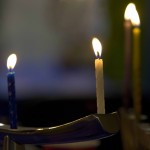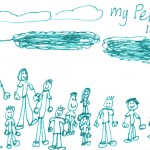Time for a New Tradition?
We lit the candles. Perhaps we welcomed in the ministering angels by singing Shalom Aleychem. Some men may have recited the traditional text of Eshet Chayil in praise of their wives; others have relied on their own words of gratitude for their friends and partners. And the children have been blessed.
We chant Kiddush (sanctification), welcoming in the Sabbath with a prayer of praise that allows our borei p’ri hagafen (creator of the fruit of the vine) to be extended and expanded to express gratitude for all creation and the Sabbath we are about to welcome in.
Time to wash our hands. Water is the very essence of life and wisdom in Jewish tradition. Before we say the motzi and break bread, we wash our hands to act like the priests of old. They, too, washed before they approached the altar.
Our table is an altar of sorts. It is a holy place in time, a place where we sanctify all that nourishes us – our relationships, our families, our Sabbath rest.
We remove our rings. We pour water, often from a two-handled cup, over each hand.
One couple I know has the practice of washing their hands together, and replacing their wedding rings as a gift to each other – just as they did when they were married. It’s one way they sanctify their commitment. They make it anew with their own variation of an ancient Shabbat ritual.
Jewish tradition offers us so very many ways to enrich and sanctify our lives. Consider taking on a new tradition this Shabbat.
Have a wonderful Shabbat!
Rabbi Barbara
And for those interested, the text of Eshet Chayil…
Eshet Chayil
A Woman of Valor, who can find? She is more precious than corals.
Her husband places his trust in her and profits only thereby.
She brings him good, not harm, all the days of her life.
She seeks out wool and flax and cheerfully does the work of her hands.
She is like the trading ships, bringing food from afar.
She gets up while it is still night to provide food for her household, and a fair share for her staff.
She considers a field and purchases it, and plants a vineyard with the fruit of her labors.
She invests herself with strength and makes her arms powerful.
She senses that her trade is profitable; her light does not go out at night.
She stretches out her hands to the distaff and her palms hold the spindle.
She opens her hands to the poor and reaches out her hands to the needy.
She has no fear of the snow for her household, for all her household is dressed in fine clothing.
She makes her own bedspreads; her clothing is of fine linen and luxurious cloth.
Her husband is known at the gates, where he sits with the elders of the land.
She makes and sells linens; she supplies the merchants with sashes.
She is robed in strength and dignity, and she smiles at the future.
She opens her mouth with wisdom and a lesson of kindness is on her tongue.
She looks after the conduct of her household and never tastes the bread of laziness.
Her children rise up and make her happy; her husband praises her:
“Many women have excelled, but you excell them all!”
Grace is elusive and beauty is vain, but a woman who fears God — she shall be praised.
Give her credit for the fruit of her labors, and let her achievements praise her at the gates.
Proverbs 31:10-31







